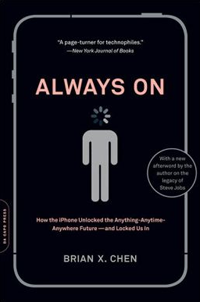I've uploaded reading notes from Brian Chen's Always On, a book about the impact that smart phones are having, and could potentially have in future, as a mobile communication devices that provides the user with the ability to be constantly connected to information, resources, and other people. Having just finished reading it, I'm not entirely sure that it was time well spent.
The author doesn't bring a broad perspective, or a deep one, or a particularly insightful one. The book skips along the surface of a handful of topics, revels in extended anecdotes and general observation, and ultimately fails to make much sense of things. It merely dredges up information and spits it at the reader in amorphous chunks, more like a series of blog entries with commentary on news clippings than a proper book. So in that sense, I don't think I've gained much by taking the time to read it.
But at the same time, even a bad book can be a good exercise - when an author barely scratches the surface, an interested reader seeks out additional information from other sources; when he makes a specious or statement, the reader must seek a more reliable source of information from other sources; when he makes a specious of obviously biased conclusion, the reader must seek the truth from other sources.
So in the end, reading this book was a worthwhile endeavor - though not for the sake of anything contained within it, but rather as an exercise in assessing the sufficiency and veracity of information and doing research to amend and augment its shortcomings.
I do wonder how many readers actually do such things - and worry that some might take whatever they read at face value and investigate no further. But then, that is a form of intellectual neglect that will ultimately avenge itself.

No comments:
Post a Comment